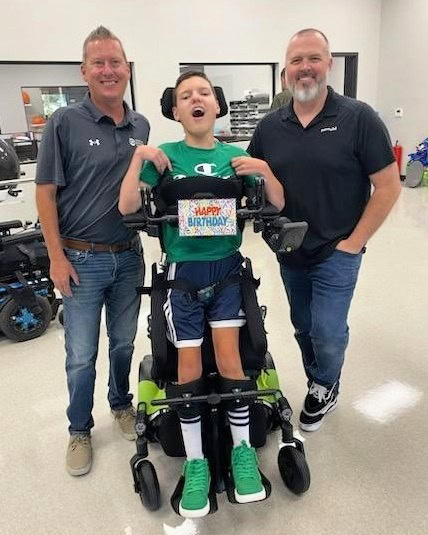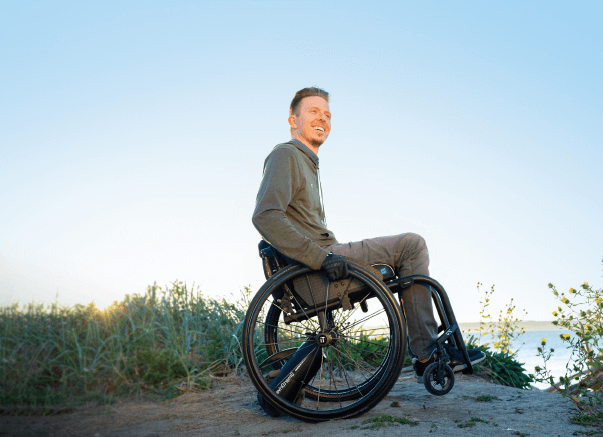Shaping the Next Generation of ATPs
Jason Miele, NSM’s Vice President of Learning and Development, on the important industry role of ATPs and why investing in and developing the next generation matters
In the Complex Rehabilitation Technology (CRT) industry, assistive technology professionals (ATPs) play a crucial role in ensuring CRT users achieve their desired level of independence. As the experts on mobility equipment, ATPs work collaboratively with CRT users, their families, caregivers, physicians and therapists to recommend mobility equipment that fits the user’s physical needs and mobility goals. As consultants, ATPs must also stay up-to-date on new and emerging technologies in the ever-evolving industry, allowing them to offer CRT users the most advanced and effective mobility solutions.

ATPs clearly have an important job. Their knowledge of available mobility solutions and technologies, expertise, experience and compassion are valuable tools that help CRT users keep moving through life. Understanding the significance of this vital industry role, National Seating & Mobility is committed to finding concrete, creative ways to invest in today’s ATPs while also shaping the next generation. We talked to Jason Miele, NSM Vice President of Learning and Development, to learn more about how NSM is working to develop ATPs.
What is an ATP and what do they do?
ATPs are mobility, seating and position experts. They are part of a CRT users’ care team and provide recommendations, consultation and education to the CRT user and their medical team to find mobility equipment that best fits their medical, functional and overall health needs. ATPs don’t drive the process of obtaining mobility equipment; they serve as consultants, partnering with medical providers to identify the best possible mobility solution for each CRT user’s needs and goals.
What types of certifications or training do ATPs need?
The Rehabilitation Engineering and Assistive Technology Society of North America (RESNA) governs professional standards of practice and ethics for ATPs to ensure consumers receive the highest quality of care and service provision. To become an ATP, you must meet specific educational requirements outlined by RESNA, have experience in the CRT and assistive technology space and complete continuing education requirements. To be credentialed as an ATP through RESNA, you have to complete an exam that measures your understanding of the foundational standards of practice. After that, ATPs must renew their credentials every two years and provide evidence of continuing education hours.
How is NSM working to develop the next generation of ATPs?
At NSM, we’ve developed several initiatives to invest in the next generation of ATPs. These include:
- Career Pathways: NSM provides structured career development opportunities for internal associates interested in becoming ATPs, allowing employees to progress within the company.
- Technician-to-ATP Development: We have established a proven methodology for training technicians and supporting their journey to RESNA credentialing.
- Industry Partnerships: Collaborations with RESNA and NRRTS help us shape training programs and industry standards for future ATPs.
- Clinical ATP Program: This initiative targets credentialed Occupational, Physical, and Speech-Language Pathologists who are interested in transitioning into CRT. The program provides specialized training to develop the necessary skills and prepare them for the RESNA exam.
Why are these types of investments important? How do they help CRT users?
Only a finite number of academic institutions and professional organizations currently produce and develop ATPs. Knowing this, the CRT industry must continue to invest in and develop highly trained ATPs, especially as current ATPs retire or transition to adjacent industries. At NSM, we believe that ATPs are the “center of gravity” in our work in communities across the United States. We’re committed to providing positive clinical outcomes and serving our clients long-term, so we continue to invest in ATP development and sustainment.
Preparing for your first appointment with an ATP or an upcoming evaluation? Here’s what you need to know.
More Stories
Related Articles
5 Things to Know as You Start the New CRT Equipment Process
When it’s time to get new complex rehabilitation technology (CRT) equipment, the process can feel overwhelming. Even if you’ve been through the experience before, it’s…
National Seating & Mobility Takes the Hassle Out of Managing Medical Supplies
We work with your insurance, healthcare providers and top manufacturers to keep your supplies coming — seamlessly. For caregivers and those who rely on home…
Did You Know: Temporary Wheelchair Replacement Coverage
Did You Know: Most commercial insurance carriers don’t cover loaner equipment for CRT users? It’s common to expect a loaner or rental car coverage when…


